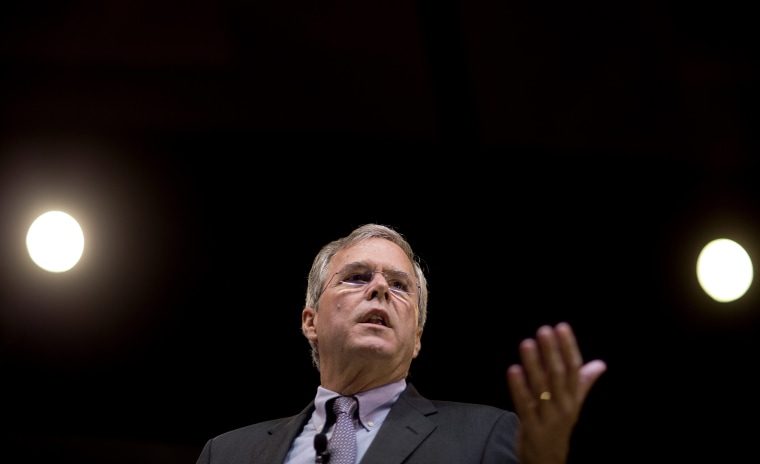Jeb Bush aggressively went after Hillary Clinton over her tenure as secretary of state, linking her to a broad overall criticism of the Obama administration's actions in the Middle East Tuesday night.
"Who can seriously argue that America and our friends are safer today than in 2009, when the President and Secretary Clinton - the storied "team of rivals" - took office?" the GOP presidential candidate said in a foreign policy speech delivered at the Ronald Reagan Presidential Library.
Bush's ramped-up rhetoric toward the Democratic presidential front-runner comes after facing criticism earlier this month for not responding more strongly to Clinton's own critiques of his record.
"Like the president himself, she had opposed the surge…then joined in claiming credit for its success … then stood by as that hard-won victory by American and allied forces was thrown away," Bush said of Clinton. "In all her record-setting travels, she stopped by Iraq exactly once."
Hillary Clinton’s campaign launched its own counter-attack earlier in the day when senior policy advisor Jake Sullivan held a conference call with reporters to say Bush’s attacks were false and questioned the governor’s strategy in starting a foreign policy debate over Iraq.
“What is he suggesting we do differently? More boots on the ground?” Sullivan asked. “If that is what he wants -- more American boots on the ground in combat in Iraq -- he should come out and say so.”
Tuesday night’s speech comes after early missteps in the campaign in which Bush fumbled questions of whether or not he would have ordered the invasion of Iraq in 2003 -- ultimately saying that, knowing what we know now, he would not have authorized the war.
Addressing the Iraq issue, Bush said, “No leader or policymaker involved will claim to have gotten everything right in the region, Iraq especially,” going on to call the surge of military and diplomatic operations a bright spot after failures in both intelligence and combat.
But Bush said the success of the 2007 surge was scuttled. Hitting Obama and Clinton once again, saying they were "so eager to be the history-makers, they failed to be the peacemakers."
The critiques of Obama and Clinton centered on the United State’s withdrawal from Iraq -- a move Bush called a “fatal error” -- that he says created space for ISIS to grow and opportunity for countries like Iran to exude influence.
Clinton’s campaign was quick to pounce on that attack, saying, “It was President [George W.] Bush who set the withdraw date for Americans from Iraq -- not President Obama.”
The former Florida governor regularly calls ISIS the "the greatest national security threat that we face," and he has not ruled out using ground troops to go after the terrorist group.
“Right now, we have around 3,500 soldiers and marines in Iraq, and more may well be needed.” Bush said Tuesday. “We do not need, and our friends do not ask for, a major commitment of American combat forces.”
At the Reagan Library, Bush called for an offensive approach to combating the Islamic State that begins with engaging allies in the region as well as strengthening our own military as a means of strengthening influence.
"Radical Islam is a threat we are entirely capable of overcoming, and I will be unyielding in that cause should I be elected President of the United States," Bush said in outlining five specific points he said he would take as president.
His plan includes first expanding and hastening efforts to rebuild the Iraqi security sector. Followed by the continued use of American airpower, better use of forces already on the ground, additional support to Kurdish fighters and a reboot to diplomatic efforts.
Bush’s proposals also expanded to Syria, where the governor called for the defeat of Bashar al-Assad by empowering moderate rebels, aiding Syrian forces fighting ISIS, the establishment of safe zones and the declaration of a no-fly zone.
“The last thing we need in Syria is a repeat of Libya, with its plan-less aftermath, where the end of a dictatorship was only the beginning of more terrorist violence, including the death of 4 Americans in Benghazi,” he said.
On Iran, Bush called on Congress to reject the nuclear deal, saying, “It is a deal unwise in the extreme, with a regime that is untrustworthy in the extreme,” going on to say, “If the Congress does not reject this deal, then the damage must be undone by the next president – and it will be my intention to begin that process immediately.”

